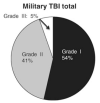The Boston Assessment of Traumatic Brain Injury-Lifetime (BAT-L) semistructured interview: evidence of research utility and validity
- PMID: 23535389
- PMCID: PMC3997066
- DOI: 10.1097/HTR.0b013e3182865859
The Boston Assessment of Traumatic Brain Injury-Lifetime (BAT-L) semistructured interview: evidence of research utility and validity
Abstract
Objective: Report the prevalence of lifetime and military-related traumatic brain injuries (TBIs) in Operation Enduring Freedom and Operation Iraqi Freedom (OEF/OIF) veterans and validate the Boston Assessment of TBI-Lifetime (BAT-L).
Setting: The BAT-L is the first validated, postcombat, semistructured clinical interview to characterize head injuries and diagnose TBIs throughout the life span.
Participants: Community-dwelling convenience sample of 131 OEF/OIF veterans.
Design: TBI criteria (alteration of mental status, posttraumatic amnesia, and loss of consciousness) were evaluated for all possible TBIs, including a novel evaluation of blast exposure.
Main measures: BAT-L, Ohio State University TBI Identification Method (OSU-TBI-ID).
Results: About 67% of veterans incurred a TBI in their lifetime. Almost 35% of veterans experienced at least 1 military-related TBI; all were mild in severity, 40% of them were due to blast, 50% were due to some other (ie, blunt) mechanism, and 10% were due to both types of injuries. Predeployment TBIs were frequent (45% of veterans). There was strong correspondence between the BAT-L and the OSU-TBI-ID (Cohen κ = 0.89; Kendall τ-b = 0.95). Interrater reliability of the BAT-L was strong (κs >0.80).
Conclusions: The BAT-L is a valid instrument with which to assess TBI across a service member's lifetime and captures the varied and complex nature of brain injuries across OEF/OIF veterans' life span.
Figures


References
-
- Vasterling JJ, Brailey K, Proctor SP, Kane R, Heeren T, Franz M. Neuropsychological outcomes of mild traumatic brain injury, posttraumatic stress disorder and depression in Iraq-deployed US Army soldiers. Br J Psychiatry. 2012;201(3):186–192. - PubMed
-
- Hoge CW, McGurk D, Thomas JL, Cox AL, Engel CC, Castro CA. Mild traumatic brain injury in U.S. soldiers returning from Iraq. N Engl J Med. 2008;358(5):453–463. - PubMed
-
- Terrio HP, Nelson LA, Betthauser LM, Harwood JE, Brenner LA. Postdeployment traumatic brain injury screening questions: sensitivity, specificity, and predictive values in returning soldiers. Rehabil Psychol. 2011;56(1):26–31. - PubMed
-
- Schell T, Marshall G, Tanielian T, Jayox L, editors. Invisible Wounds of War: Psychological and Cognitive Injuries, Their Consequences, and Services to Assist Recovery. Vol 4. RAND; Santa Monica, CA: 2008. Survey of individuals previously deployed for OEF/OIF; pp. 87–116.
-
- Schneiderman AI, Braver ER, Kang HK. Understanding sequelae of injury mechanisms and mild traumatic brain injury incurred during the conflicts in Iraq and Afghanistan: persistent postconcussive symptoms and posttraumatic stress disorder. Am J Epidemiol. 2008;167(12):1446–1452. - PubMed
Publication types
MeSH terms
Grants and funding
LinkOut - more resources
Full Text Sources
Other Literature Sources
Medical
Research Materials

